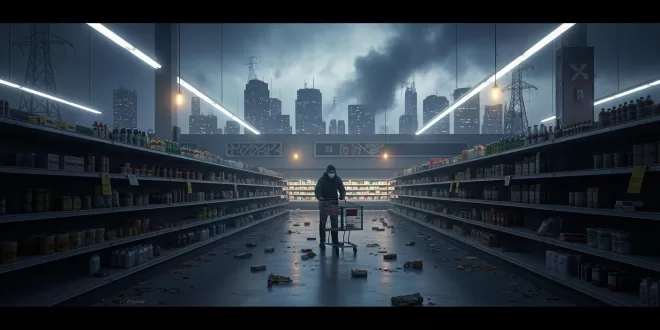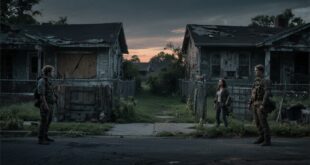From Pandemic to Gridlock: Lessons From COVID Applied to the Next Crisis
It does not matter if you believe COVID was a hoax or not. It does not matter if you think it was real, fake, planned, or accidental. What matters is what actually happened and how those events exposed just how fragile our society really is. Regardless of your stance on the origins or politics surrounding it, the truth is that COVID forced the modern world into its largest stress test in generations. Shelves went empty, hospitals were stretched beyond their limits, schools and businesses shut their doors, and everyday life was flipped upside down almost overnight.
This is not about arguing the science or debating government responses. This is about learning from what unfolded so that when the next crisis comes, whether it is a pandemic, cyberattack, grid failure, or war, you and your family are not caught unprepared. COVID showed us the weak points in our systems, and it would be foolish not to take those lessons and apply them to whatever comes next.
Supply Chain Fragility and Empty Shelves
Perhaps the most shocking reality that COVID revealed was how quickly the global supply chain can grind to a halt. For decades we have lived in an era of just in time logistics. Warehouses keep minimal inventory, trucks deliver goods on a daily schedule, and stores count on shipments arriving like clockwork. When those links broke down, it did not take long before panic buying stripped shelves bare.
We all remember the sight of people fighting over toilet paper. But it was not just paper goods. Canned foods, disinfectants, flour, pasta, rice, even pet food disappeared. And this did not happen after months of crisis, it happened within weeks. Imagine what a larger disaster would do to those same fragile systems.
The lesson here is simple. Never assume the shelves will always be stocked. Preparedness means having enough food, water, and household essentials to ride out weeks or even months without depending on the grocery store. Long term food storage, bulk dry goods, and rotating stock in your pantry are not luxuries, they are lifelines. If your plan is to just go buy more when you need it, then you do not have a plan at all.
Another overlooked point is that supply chain disruptions ripple globally. COVID lockdowns in China meant factories that produced components, packaging, or raw materials went offline, and suddenly products halfway around the world became impossible to find. It reminded us that we are not only vulnerable locally but globally. Which means the more self sufficient you are in your own home and community, the better your chances when those chains snap.
Medical Preparedness at the Household Level
The second great lesson was the fragility of the medical system. Hospitals filled up. Appointments were delayed. Essential medicines became scarce. Pharmacies struggled to restock common prescriptions, and equipment shortages made headlines. In many parts of the world, even basic protective gear like masks and gloves vanished.
For preppers, this confirmed what we have said for years. You cannot rely solely on the system to take care of you in a crisis. When the system itself is overwhelmed, you are on your own.
Household level medical preparedness is critical. That means:
- Keeping at least 90 days and ideally a year of essential medications if you or family members rely on them
- Stocking a robust first aid kit with trauma supplies, not just band aids
- Learning basic medical skills such as how to clean and dress wounds, how to spot infection, how to manage fevers and dehydration
- Storing over the counter meds like pain relievers, cold medicines, and antibiotics where legal
- Having protective gear such as masks, gloves, and sanitizer so you are not scrambling when a crisis hits
COVID proved that pharmacies and hospitals can run out or shut their doors entirely. In a future crisis, whether it is another pandemic or a grid collapse, your home may become the hospital of first resort. The question is whether you are prepared for that responsibility.
The Importance of Mental Preparedness During Isolation
While supply shortages and medical challenges made headlines, there was another lesson that too many people underestimated. That lesson was the mental toll of isolation. For many, lockdowns were the first time they faced long stretches of uncertainty and separation from normal life. Depression, anxiety, substance abuse, and even domestic violence surged during that period.
Preparedness is not only about physical supplies, it is also about mental resilience. Disasters isolate, and isolation breaks people down. If you are not mentally prepared, you are vulnerable in ways no food stockpile can fix.
The lesson from COVID is to build strong routines, connections, and outlets before the crisis hits. Have hobbies, skills, and activities that keep your mind active. Make sure your family knows how to spend time productively without relying on screens. Create systems of communication with friends and neighbors even if the internet goes down. Faith, prayer, journaling, physical fitness, all of these are anchors when the storm of isolation hits.
We often focus on whether we have enough bullets, beans, and bandages, but what about the willpower and discipline to endure months without normal social contact. COVID reminded us that prepping is not just about surviving the body’s needs, but also the mind’s.
Building Redundancy So You Are Not Dependent on One System
COVID also revealed the dangers of depending too heavily on any single system. Whether it was the medical system, the global supply chain, or even communications, people who lacked redundancy were the ones who suffered most.
The wise prepper builds backups upon backups. If the power goes out, do you have solar, a generator, or a wood stove. If the internet fails, do you have radios or an offline way to communicate. If your food supply chain dries up, do you have a garden, livestock, or long term storage to fall back on.
Redundancy is the heart of preparedness. COVID proved how quickly a single point of failure can cascade. Trucking slowed down, shelves emptied, and within weeks millions of people were dependent on government stimulus checks and emergency measures. Those with layers of backup systems such as home businesses, side income, or multiple supply caches weathered the storm far better.
Prepping is not paranoia. It is simply acknowledging that depending on fragile systems makes you fragile too. By building redundancy, you turn fragility into resilience.
Community Preparedness and the Value of Local Networks
One lesson that COVID highlighted, though it did not always make headlines, was the importance of community. When supply chains faltered and services were stretched thin, many people found that their neighbors became the most valuable resource. Some neighborhoods organized food swaps, others coordinated childcare, and countless people relied on informal networks to share supplies or skills.
In the preparedness world it is tempting to think in terms of rugged individualism, but history shows that strong communities survive longer than isolated households. Having trustworthy people nearby means extra sets of eyes for security, shared labor for heavy tasks, and the ability to pool knowledge when problems arise. A lone prepper might have food, gear, and weapons, but even the best equipped individual will face limits if completely on their own.
The takeaway is to invest now in building those connections. Get to know your neighbors, identify who has medical knowledge, gardening experience, or mechanical skills, and be willing to offer your own strengths in return. When the next crisis strikes, your community could be the difference between barely surviving and actually thriving.
Why These Lessons Matter Now
What makes COVID such a useful case study is that it happened in peacetime, with no war on our soil, no nukes in the air, and no total collapse of civil order. Yet even under those conditions, we saw how quickly modern life can fracture. If the next crisis is larger, harsher, or longer lasting, the lessons learned become even more important.
Prepping is not about fear. It is about wisdom. The pandemic showed us that being caught flat footed is costly. Families who prepped even a little were spared the worst of the chaos. Those who relied on the system paid a higher price.
The next crisis may not be a virus. It might be a cyberattack, a financial crash, a natural disaster, or something we cannot even imagine yet. The cause is less important than the response. And our response should be grounded in what we already know. Systems fail, shelves empty, hospitals overflow, and people crack under isolation.
The question is not whether another crisis will come, but whether you will be ready when it does.
Final Thoughts
COVID was a stress test. Some passed, some failed. Regardless of what you believe about its origins, the fact remains that it exposed the vulnerabilities of a modern world built on fragile systems and shallow reserves. The people who had prepared, even in small ways, found themselves in far better shape than those who did not.
The lessons are right in front of us. Build food storage. Stock medical supplies. Protect your mental health. Create redundancies so you are not dependent on fragile systems. Those who take these lessons seriously will be the ones who not only survive the next crisis but do so with confidence and strength.
Preparedness is not about being afraid of the future. It is about being ready for it.
 Survive Our Collapse Building Self-Reliance in an Uncertain World
Survive Our Collapse Building Self-Reliance in an Uncertain World





We’d love to hear from you. What got you interested in preparedness, and what steps are you taking right now to make your family more resilient? Share your story in the comments below—we learn best when we learn from each other